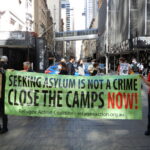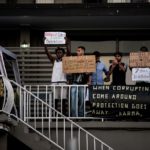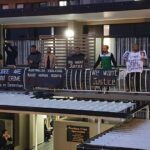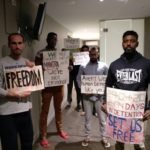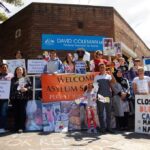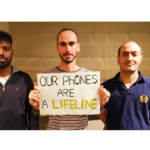“The Government Has Shown No Mercy”: Dane de Leon on a KP120 Refugee Suicide Attempt
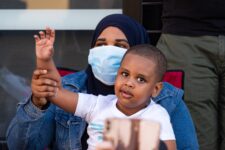
Saif Ali Saif has been one of the 120-odd former offshore asylum-seeking detainees, who have been staging a daily afternoon protest on the balcony of Brisbane’s Kangaroo Point Central Hotel since April this year.
Known as the KP120, the men are protesting their detention after having been transferred from Nauru or Manus to undergo much-needed medical treatment only to have been locked up in a hotel now designated as an alternative place of detention (APOD).
Saif’s story has been central to the campaign calling for the release of these men, as his wife and child have been living in community detention just 20 minutes away from the hotel where he’s been held for the last year.
The refuge from Somalia could see his wife Sabaah and their son Sami from the balcony. But he couldn’t go and support his wife as she recently underwent multiple surgeries, and nor could he mind his son during the operations.
And these circumstances drove Saif to attempt to hang himself in the early hours of last Saturday.
An excessive show
As Saif’s family story has been such a focus for activists leading a sustained campaign to see the refugees freed, their emotions were unsurprisingly high on learning of their friend’s attempt to take his own life, so they got out on the streets on Sunday afternoon to demonstrate.
And as the protesters were gathered out the front of the Kangaroo Point Hotel, one Queensland police officer ran in and punched Jeff Rickert in the side of the face from behind, causing the middle-aged demonstrator to drop to the ground.
The officer who threw the punch then moved around behind his victim and commenced pushing, shoving and swiping at other protesters who were rushing in to assist Rickert, who lay stunned on the ground.
But, despite all the footage of the incident, the media reports, and the fact that Rickert has spoken to the press, the Queensland Police Service announced that the officer didn’t strike him “directly”, and it was merely the camera angle that made it “look far worse than it potentially” was.
Tireless campaigners
After being held at Kangaroo Point for over a year and being made to watch his wife and son on the outside of the hotel complex but not allowed to embrace them, Saif has now been transferred to the more isolated Brisbane Immigration Transit Accommodation (BITA) facility.
Refugee Solidarity Meanjin has been one of the main organising groups behind the Free the KP120 campaign. And its spokesperson Dane de Leon has been on the frontline of the demonstrations, which at one point entailed being taken into police custody.
Sydney Criminal Lawyers spoke to Dane about how it comes to be that Saif has been so close to his family and yet still separated, the level of brutality the police have been showing protesters, and how the refugee family is holding up after a weekend of turmoil.
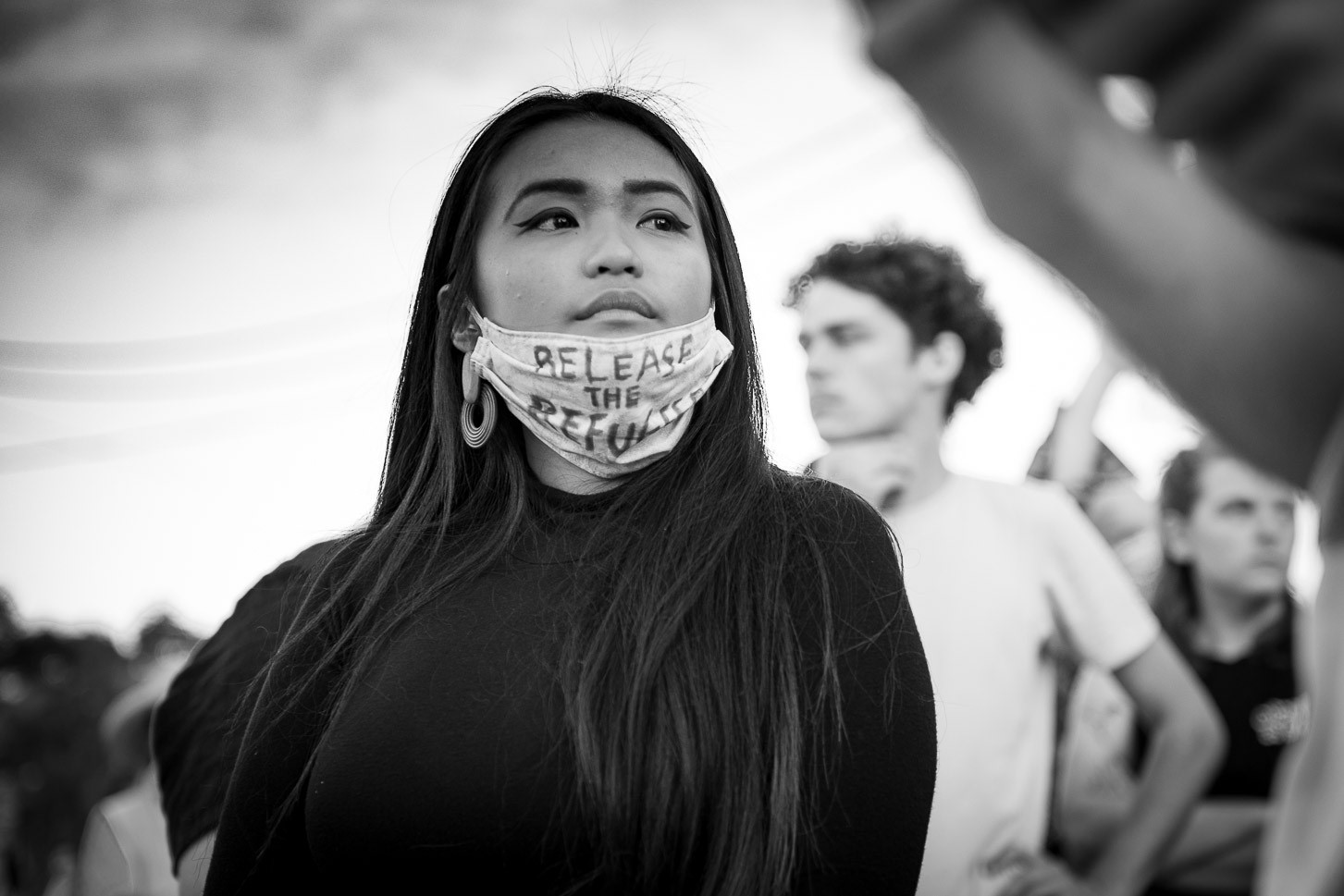
Firstly, Saif is one of the former offshore detainees who have been held at the Kangaroo Point Central Hotel. At the same time, his wife Sabaah Zihad and his son Sami are both living in community detention.
Early on Saturday morning, Saif tried to take his own life. Dane, in your understanding, what happened?
It was 3.30 am when Saif self-harmed. That evening Sabaah was in hospital. She has been unwell over the past four months. She has been hospitalised five times. And one operation was stalled, because she didn’t have anyone to look after her son.
So, Saif was feeling helpless and powerless in not being able to be there for his wife or for his son during the operation.
Saif has been watching his son grow from the balcony at Kangaroo Point. And he’s been protesting on the balcony every single day since April.
Now, he’s been transferred to a higher-security prison.
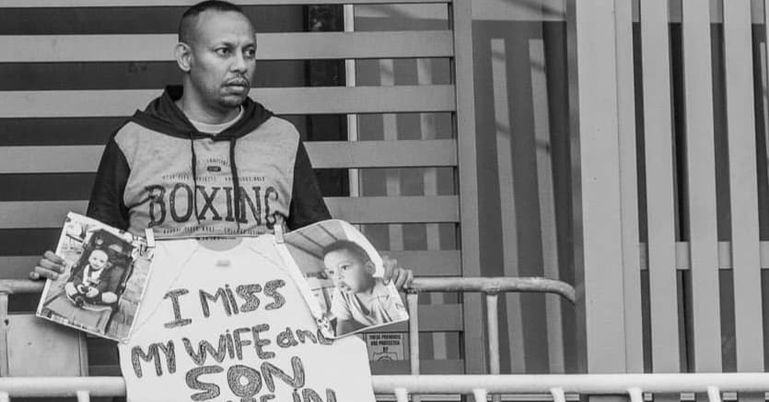
Having fled their homeland of Somalia, both Saif and Sabaah were offshore detainees being held on Nauru.
How does it come to be that they’ve been living in such close proximity to each other, but still separated?
Their son Sami was born on Nauru at one of the offshore processing centres. Sami was very unwell and needed treatment that wasn’t available over there. So, he had to come to Australia.
The government said he could come, but he could only have one parent with him. Essentially, Sami would have died if he’d been left offshore, so Sabaah and Sami came here and were placed in community detention.
Community detention is still carceral in a way, in that they have curfews and caseworkers check in on them. So, they’re still not granted freedom.
That happened about three years ago, when Sami was six months old.
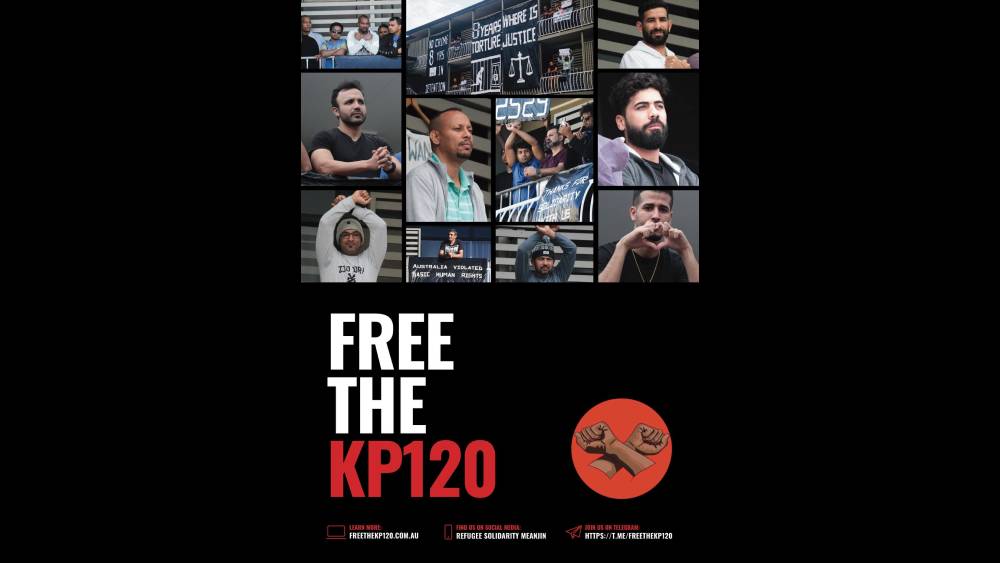
Saif, Sabaah and their baby were able to live together on Nauru. But, for the past year, the family has been living within 20 minutes of each other, and the authorities still won’t let them reunite.
What purpose would you say it serves the government to maintain this?
It’s always been a political issue. Liberal and Labor are both complicit in the indefinite detention regime.
People forget that it was the Labor government that introduced the policy that if you arrive by boat you will never be settled in Australia.
That law came in July 2013. And a lot of the people came just three days after. They were already on the boat, and they were sent to offshore processing.
We know that there’s not even an economic argument, because it costs $350,000 per person a year to be detained inside those facilities.
So, it’s not an argument of progress or making things economically stable, this is just a racist policy that the government continues to uphold, because that’s what they believe will gets them votes.
If they maintain strong borders, they think that’s what will get them votes, because this country was built on genocide and white supremacy.
So, the level of cruelty involved in the refugee system is on purpose?
Absolutely. Alan Tudge has the power right now – if he wanted – to let these men out into the community. The paperwork is right in front of him.
He’s read all their cases for the last seven years. He knows they’ve committed no crimes. He knows their behaviours. Everything they do is monitored. Tudge could do it right now if he wanted to.
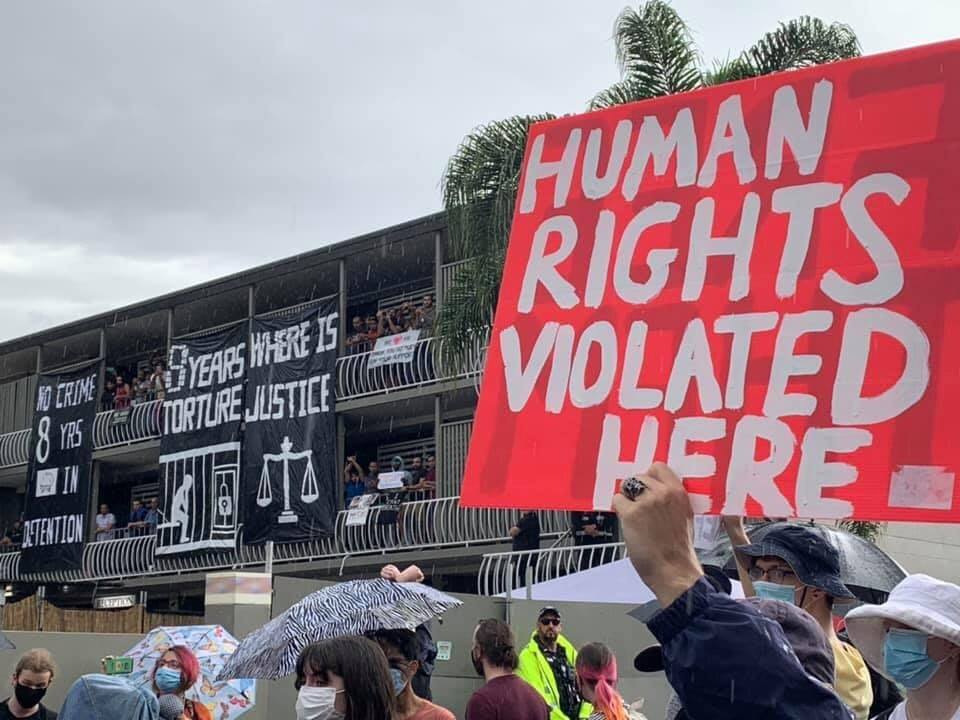
Refugee Solidarity Meanjin and other refugee organisations have been leading an ongoing campaign to see the KP120 released into the community over the entire pandemic period.
The story of Saif’s family has been a central focus of the campaign. How have the supporters taken the news of his attempted suicide?
A lot of us are overwhelmed. We are shaken that someone so close to us – who we see every day on the balcony – has tried to take his own life.
He attempted suicide on Saturday at 3.30 in the morning. And on Sunday, we all showed up at the prison, and took our anger and sadness to the streets.
We did a march. We saw the guys on the balcony. We made sure that they knew they’re not alone.
A lot of us know how tiring it can get to always be mobilising and organising, but we know that nothing we go through out here can compare with eight years of detention.
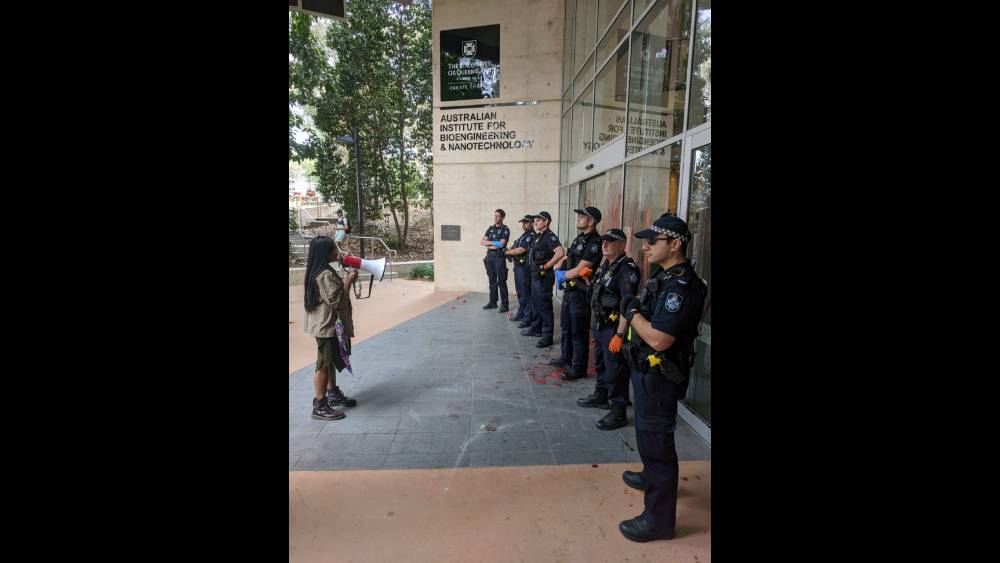
During Sunday’s demonstration, a Queensland police officer punched an older demonstrator in the side of the head from behind.
Why are the police using such tactics in dealing with protesters? And how does this incident stack up to others in the past?
The overstepping of police powers has been ongoing since the start of our marches.
When we were just walking around the facility exercising, they would misuse move-on orders to try and get rid of us, or public nuisance charges, when we weren’t interfering with anyone.
We know the police are trained to follow orders, and they’re trained to do as they’re told. And we can tell that they haven’t been thinking critically at all, because they haven’t helped anybody who’s been distressed.
When a protester gets punched by a racist at an action, the police don’t do anything. When racists are yelling at us when we’re marching, the police don’t do anything. It really shows who they’re protecting and servicing.
The brutality of this particular incident – where one of the protesters was king hit – was awful. It was particularly bad because it was filmed and there were so many angles. You cannot cover this up.
We’ve had terrible instances of this before, when a cop stepped on a young person’s neck and they had a seizure.
So, we’re not new to this level of brutality. But, at the same time, we shouldn’t be normalising it. Each time, we should be shedding a light to it.
If they’re willing to do this to a middle-aged white guy in broad daylight with cameras around, imagine how they’re treating Indigenous people in custody, or how Serco guards are treating the refugees detained inside.
Despite the footage, Queensland police has gone on to deny the incident happened, is that correct?
Absolutely. Their main argument is that it was a bad camera angle. We just posted a video today, showing it from many different angles. And Jeff has spoken out publicly about it.
The police also lied and said the man wasn’t taken to hospital. But he was there overnight and was released on Monday afternoon. None of the police, I saw, called for medical help. It was one of the community members who called triple 0.
The police kept antagonising and escalating things as the man was lying on the ground.
We thought we were going to lose someone, with a man lying in front of us with blood coming out of his ear. And none of the cops did anything.
Saif has been moved away from his friends in Kangaroo Point to the more isolated BITA facility. How is he doing now? And how are his wife and his son coping?
I called Saif after the action. It did lift his spirits to see the community show up and share the anger that he’s feeling. He was holding up a photo of Sami and still protesting out there. He’s still going.
The fight hasn’t stopped just because we can’t see him anymore. We still want to see the family reunited.
Sabaah was released from hospital yesterday. She’s going to need another procedure sometime soon. Sami is with her. And I will be there supporting them throughout the week.
And lastly, Dane, there’s a rally and mass action organised for the end of this week. What’s that going to involve? And further, how do you see this all developing from here?
We’ve organised a mass action on 30 October at 5 pm at King George Square. We want it to be as participatory as possible. A mass action means that there are no organisers and there’s no hierarchy.
How people express their anger and their sadness and their love, will be up to them. But we are going to do it together.
From here, all we can see is to escalate further and put pressure on. One of our friends inside said it best, when he said, “There is no pressure, when there is no protest. And if there is no pressure, there is no freedom.”
So, we will keep fighting. This issue has been ongoing for seven-eight years. There’s no need to be polite or respectable about it, because the government has shown no mercy.


